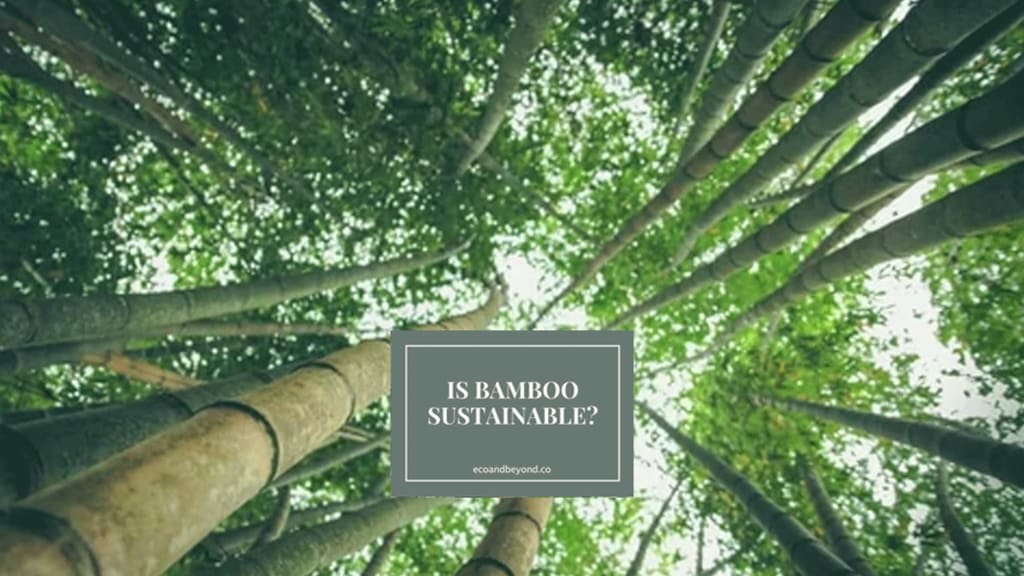
In South-East Asia, bamboo is known as "green steel." It has made its way into every area of our lives, including the furniture and textiles we use. A recent American study estimated that the global bamboo market would reach $53.3 billion in 2020 and reach $82.9 billion by 2028. But can bamboo be considered sustainable? While many manufacturers claim that the wood is environmentally friendly, the actual material can be toxic and contain high levels of pesticides.
The truth is, it depends on the specifics. Bamboo has been used in many products for decades. But is it sustainable? The answer will depend on how it is produced. Some bamboo textiles are chemically processed and marketed as rayon and viscose. The industry's stance on this material has fluctuated over the years. Some manufacturers have chosen to stop using it altogether, while others have continued to use it in their manufacturing processes.
Most Sustainable
A recent study showed that bamboo production was one of the most sustainable in the world. Its growth requires no chemicals or pesticides. In addition, bamboo can improve the soil and has no adverse effects on the environment. Its sustainability makes it a popular choice for many. In short, bamboo is a green alternative to plastic. Whether you choose to use it as a sustainable or non-sustainable product depends on your preference.
The sustainability of bamboo depends on how it is grown. Its fast growth and short maturity time make it a popular wood alternative in some parts. In addition, it is often more environmentally friendly than other types of wood. If it is grown responsibly, it can be a better source of timber than other alternatives. However, if you are worried about the environment, you should consider your options.
The truth is:
Some companies sell eco-friendly bamboo products and bamboo furniture, but not all are eco-friendly. Some of these companies are making a big push for development. This is a good thing for the environment because plastic kills our wildlife and pollutes much of our environment. Furthermore, bamboo doesn't need to be thrown away or composted.
More Expensive
It is an excellent option for fashion and eco-friendly clothing. It uses fewer chemicals in its manufacture than cotton and is a greener option in terms of environmental impact. However, some brands are even more ignorant than cotton, so they are more expensive. Moreover, bamboo is an excellent choice for intimate products. The resulting fabric is soft and luxurious, and it doesn't require any pesticides.
Bamboo is Not Only Green.
The truth is that bamboo is sustainable because it is a renewable resource. It has been a popular choice in the fashion industry for decades. And it is environmentally friendly. So the truth is that bamboo is not only green but is also eco-friendly. It is also known to be an excellent alternative to plastic.
The answer is no.
Bamboo has been used for centuries in many Asian countries despite its fast growth. It is used to make furniture, rugs, and other products. The plant's rhizomes allow it to increase. Its growth speed is similar to that of a hardwood tree. It is even more environmentally friendly than plastic. If appropriately used, bamboo is a sustainable crop that uses fertilizer.
The Truth:
This plant is considered environmentally friendly in many countries. Some countries utilize bamboo for its fast growth rate and ability to absorb carbon. Some claim that bamboo is more sustainable than cotton and releases 35% more oxygen than trees. Another benefit is that it is a more productive crop than other trees. It can even be used as a source of electricity for buildings. In addition to its high carbon-free potential, bamboo is a renewable resource.
Some Environmental Advantages
The popularity of bamboo is growing, but can it be considered sustainable? Making bamboo textiles is complex, and it involves a chemical process. The result is a material that is soft and reminiscent of wood. This material is then made into apparel & clothing coupons and is usually labelled viscose or rayon. Some rayon fabrics contain up to 10% organic bamboo fibres. While bamboo has some environmental advantages, it's still a controversial choice, so you should do your research and make an informed decision before buying.
Bamboo is a Renewable,
The highly sustainable resource that is grown in China. It is not suitable for composting, and plastic kills wildlife and pollutes much of our environment. Although some plastic can be recycled, it requires tremendous energy. In addition, bamboo cannot be regrown. As a result, it is not sustainable. It's important to consider all the benefits of using bamboo before purchasing bamboo products.
Among other Environmental Benefits,
Bamboo is a renewable resource. It is used for everything from clothing to furniture. The company Cariloha also sells bamboo underwear and clothes and several eco-friendly accessories. In addition, the company promotes the benefits of the bamboo industry and actively supports numerous worthy causes. Several myths surround bamboo, but the facts overwhelmingly favour its sustainability.
Green Material
While bamboo is considered a green material, it's not as sustainable as you might think. The bamboo-based products are made with more chemicals than cotton, a less-sustainable option. However, converting bamboo to textiles does not have the same negative environmental impact as cotton. Nevertheless, it's important to note that bamboo is more environmentally friendly than cotton and polyester. This is a big deal for consumers who value ethical fashion in terms of sustainability.
The answer to this question is no.
Some manufacturers use bamboo as a sustainable material, but others use bamboo as environmentally friendly. While these products are more eco-friendly than plastic, the manufacturing process can still have some bumps. In the meantime, there are several benefits of bamboo. For example, if you're buying bamboo clothing, it's better to choose organic cotton or polyester. The reason is simple: it's a sustainable product. In addition, its manufacturing is not incompatible with a piece of conventional fabric.
The truth:
The material's benefits are plentiful. In a nutshell, bamboo is a sustainable choice for many reasons. It's biodegradable, lightweight, and easy to grow. Even though it's not sustainable, it's still an excellent choice for many people. The fashion industry is a notorious culprit for destroying the environment. Therefore, it's not surprising that bamboo is considered environmentally friendly.
It's a good idea to take a close look at the production process before purchasing bamboo with Cariloha Coupon Code. It's often a monoculture. This means that there are only two varieties of bamboo, and they're all planted together. It's not sustainable because bamboo has a high-density root system, which is very dense. As a result, its growth cycle is rapid, good for the environment.
In the Construction Industry,
Bamboo is a popular choice for sustainable building materials. Its tensile strength is superior to steel, and it is an excellent material for many household items. It's biodegradable, durable, and antibacterial. In addition, bamboo is highly resistant to mould and moisture, and it's also good for the environment. It's a sustainable choice for building.
How You Source Your Bamboo.
It depends on how you source your bamboo. Higher-end manufacturers are more transparent about their processes. A good quality product is more sustainable than a cheap imitation. Moreover, it's more environmentally friendly than conventional materials. So, is bamboo sustainable? Its popularity varies by country. However, you can find it everywhere, from toothbrushes to underwear. If you're concerned about environmental issues, be sure to read the manufacturer's website before purchasing it.
Last Words.
It's essential to understand the science behind the newest bamboo materials. No scientific studies prove it is an environmentally friendly plant despite the hype. For example, bamboo has no chemical or pesticide residues and can degrade in the soil in a few years. In terms of sustainability, the fastest-growing woody plant in the world can grow four feet a day. Furthermore, bamboo produces more oxygen than the average tree and uses little water.
About the Creator
Saving
Exclusive for you! Now Save money with Our free Saving Gain Discount Code! By Using These Coupons You can Get the Best Discounts And Offers on Your Purchase.






Comments
There are no comments for this story
Be the first to respond and start the conversation.